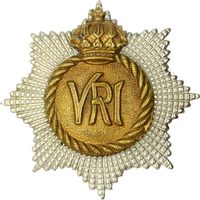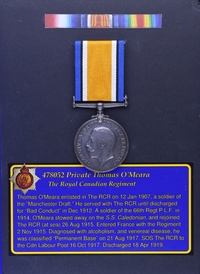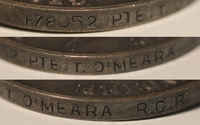
478052 Private Thomas O'Meara
The Royal Canadian Regiment
By: Capt (ret'd) Michael M. O'Leary, CD, The RCR
Thomas O'Meara was born at Boyle, County Roscommon, Ireland, on 8 Aug 1881. Enlisting as a young man, he served in the British Amy from 1900 until 1906 with the 3rd Battalion of the Manchester Regiment. The 3rd Manchesters were raised at Aldershot on 17 Feb 1900, and served in England, St Helena (1900) and South Africa (1902), returning to England in 1906 where they were disbanded after the South African War.
At the age of 24, Thomas O'Meara enlisted in The Royal Canadian Regiment on his discharged from the British Army. He was among the 156 men and boys of the "Manchester Draft," all of whom were all recorded as being taken on strength at Ashton-on-Sea, England, on 12 Jan 1907. This draft consisted of soldiers who were discharged from the disbanding battalions of the Manchester Regiment. On agreeing to enlist in The RCR, they were filling positions in the six newly created companies of the Regiment that were to execute garrison duties at Halifax.
As a soldier of the Regiment, O'Meara is shown as a "lodger" at Wellington Barracks in the 1911 Canadian census. He served in Halifax with The RCR until 31 Dec 1912, when he was recorded in a regimental ledger as being discharged for misconduct. His character on discharge was described simply as "bad."
O'Meara, however, did not give up soldiering and was serving in the Militia in 1915, with the 66th Regiment, Princess Louise Fusiliers, in Halifax. He must have been envious as he watched his old friends in The RCR during August 1915. They were recently returned from service in Bermuda, and then preparing to sail for England.
On 28 Aug 1915, Thomas O'Meara managed to return to duty with The RCR when he came out of hiding and surrendered himself aboard the S.S. Caledonian en route to England. O'Meara must have been well-known to many of the Royal Canadians aboard the Caledonian, and we are left to wonder who might have aided in keeping his presence secret until the ship was unlikely to return to harbour. Like the other six stowaways on that voyage to England, he was first attached to the 'Base' Company for rations and discipline. O'Meara was subsequently attached to A Coy for "rations, etc.," from 13 Sep 1915.
Although he had been subject to military discipline during the Atlantic crossing, it was still necessary that the basic requirements for enlisting in the Canadian Expeditionary Force be met by the stowaways if they were to continue to serve. O'Meara was duly examined at Shornecliffe on 16 Sep 1915 for re-enrolment in the Permanent Force and CEF enlistment. At 33 years of age, he was described as 5'6" tall, 142 lbs, with a 37" chest and a physical development noted simply as "Perfect." This assessment is despite notes describing some recurrent rash, possibly psoriasis, and his slight (at the time) varicose veins. Details aside, "The Board at Moore Barracks … examined this man and classified him as fit."
On 22 Sep 1915, O'Meara signed his Attestation Papers, thus officially volunteering for overseas service. The effective date of his enlistment was 26 Aug 1915, the Caledonian's sailing date. O'Meara's regimental number assigned to him by the Princess Louise Fusiliers—702—was replaced by a regimental number for The RCR—16416—, but this was changed not long after to a newly issued CEF service number: 478052.
Now that he was officially once more a soldier of the Permanent Force, and now also of the Canadian Expeditionary Force, O'Meara was soon put to work. Starting on 23 Sep 1915 he was employed as a Company Cook, and for his skills in this area, such as they may have been, he was entitled to additional Working Pay of 50 cents per day in addition to his normal pay rate of a dollar a day as a Private.
O'Meara held the position of Company Cook until 18 Oct 1915, when he returned to the Base Company. A few weeks later, on 1 Nov 1915, he landed in France with the Regiment and would spend the next year with the Regiment at the front.
The list of battle honours for The RCR in 1916 gives an indication of the actions in which Thomas O'Meara likely took part.
- Mount Sorrel; 2-13 June 1916
- Somme, 1916; 1 July - 18 November 1916
- Flers-Courcelette; 15-22 September 1916
- Ancre Heights; 1 October - 11 November 1916
After a year at the front O'Meara was granted an opportunity to rest when he was tasked to work at the Brigade Washing and Drying Plant from 12 Dec 1916 until Feb 1917. He also had another short period of work away from the Regiment at the Divisional Headquarters from 2 May until 15 Jun 1917.
During the last weeks of June 1917 the Regiment was at QUARRIES LINE for training, from which they also provided the occasional working party. In early July 1917, the Regiment went back into the front lines. Spending the first part of the month in support trenches, the War Diary notes an almost daily occurrence of men being killed or wounded in action before the unit was redeployed to Brigade and Divisional Reserve tasks.
After being back in the ranks of the Regiment for less than two months, Thomas O'Meara was hospitalized in July 1917 with diagnoses of 'delirium tremens' and alcoholism. His self-inflicted medical problems continued when he was hospitalized in August 1917, the Regiment's Daily Orders noted a 'stoppage of pay at the rate of 50 cents per diem whilst in hospital' for Venereal Disease.
O'Meara's trip back through the medical system demonstrates the stages a man might move through when being evacuated from the battlefield. In turn he was admitted to the 6th Canadian Field Ambulance, No. 1 Casualty Clearing Station (Remy Siding), Ambulance Train No. 4, and finally to No. 26 General Hospital (Etaples). There is another common feature of his rearward journey that he would have shared with a wounded soldier, a transfer from his front line unit to a Base Depot once his evacuation was necessary. Accordingly, on 12 Aug 1917, Private Thomas O'Meara was struck off the strength of The RCR and taken on strength by the 3rd Canadian Infantry Base Depot which would be his unit until found fit to return to the front or for transfer to another unit for continued employment.
Following his release from hospital, O'Meara remained with the 3rd Canadian Infantry Base Depot and was given a medical classification of 'Permanent Base' (P.B.) due to his varicose veins. Although restricted to duties at a base unit, he was found to be fit for duty on Traffic Control. He was thereafter transferred to the Canadian Labour Pool on 16 Oct 1917 and the same date effectively transferred again, this time to be "attached to Canadian Forestry Corps, Conches (Cook); Class P.B." On 19 Oct 1917 he was taken on strength of No. 24 Company of the Canadian Forestry Corps (C.F.C.)
Details of No. 24 Company, C.F.C., had arrived in France from England during February 1917 as part of the Central Group of the Canadian Forestry Corps. The Company moved to Conches in March that year and commenced cutting and sawmill operations in the Rouvray Forest that month. It would remain in that location until the end of the War.
Thomas O'Meara's service record includes a hint that he maintained at least an emotional connection to his adopted Canadian home town of Halifax, Nova Scotia. On 9 Feb 1918, he donated $5.00 from his pay account to the Halifax Relief Fund for survivors of the Halifax Explosion of 6 Dec 1917; an amount equal to five days' pay for a Private soldier.
While serving with the C.F.C, Thomas O'meara would experience a much awaited yet rare occurrence for many soldiers, a period of leave. Unless they were wounded and evacuated across the Channel, soldiers might remain in France for a year or more before their name rose to the top of a unit's leave rotation. For Thomas O'Meara, this came about on 21 Mar 1918 when he was granted 15 days leave to the UK.
During his leave, O'Meara made two withdrawals against his pay account on 21 March, in the amounts of $24.33 and $29.20, to pay for his leave activities. His two weeks of leave was financed by the equivalent of seven and one-half weeks pay (at a Private's daily rate). Although he was due to return from leave by 5 April, O'Meara didn't rejoin his unit from leave until the 10th of that month. There's was no indication in his records that he was AWOL during this period, so perhaps the extended leave period was not entirely of his own doing.
A few weeks after his return to duty at Couches, O'Meara was required to complete a new Attestation Paper, the one completed in 1915 having been lost or misfiled. On 28 Apr 1918, his new attestation was completed for the Canadian Forestry Corps. On this new form he identified his sister as next-of-kin: Norah O'Meara of Elphin Street, Boyle, Co. Roscommon, Ireland. A notation on the form confirms his prior attestation on 22 Sep 1915 at Shornecliffe even though that form was missing.
Having now admitted to having family in Ireland, O'Meara started a monthly Pay Assignment for $15 to his sister Norah in Ireland on 1 Sep 1918. This pay assignment would cease 1 Apr 1919, just before his discharge from the CEF.
O'Meara's pay records also show further withdrawals of accumulated pay when he was granted a further period of 14 days leave in the UK on 21 Jan 1919. This time, with the experience of his previous leave behind him, he crossed the Channel with a little over three months pay in his pocket as an issued "Leave Cheque." This cheque was in the amount of $97.33 in Canadian dollars, or 20 British Pounds.
When Thomas O'Meara's second leave expired on 4 Feb 1919, he remained in the UK and was struck off the strength of the CFC's No. 2 District HQ and posted to the CFC Depot at Sunningdale, Berkshire.
While at Sunningdale, O'Meara received his final medical examination of his overseas service on 13 Feb 1919. On his completed Medical History of an Invalid form, his varicose veins are recorded as a pre-existing condition which was causing him a partial loss of function in his legs. Although the disability is assessed to be permanent, no treatment is proposed. His medical category is assessed as "Bi"; allowing service abroad, but not general service. The Board's final recommendation was for O'Meara to be returned to Canada.
On 1 Mar 1919, Thomas O'Meara was struck off the strength of the CFC to Military District No. 6 at Rhyl for return to Canada. Between November 1915 and January 1919, he had served overseas in France for three years, three months.
O'Meara returned to Canada, arriving at Halifax aboard the troopship HMT Caronia on 5 Apr 1919. He was scheduled to be struck off the strength of the CEF at Disposal Station "B" in Halifax and transferred to the RCR Base Depot in Halifax. This transfer was cancelled after his arrival and he was struck off strength of the CEF on 18 Apr 1919 by reason of demobilization.
To acknowledge his service, Thomas O'Meara was entitled to wear a Class "A" War Service Badge and he was issued with badge numbered 146688. He was also entitled to a War Service Gratuity of $420 which he received in six instalments between April and November of 1919. The pay record sheet for his Gratuity shows that while receiving it O'Meara changed addresses from the P.O. Savings Bank in Halifax to 30 Franklin St, Newark, New Jersey, USA.
Post war notes in his service record show that O'Meara's medals were despatched to him on 23 Mar 1922. His medal entitlement for the First World War would be the 1914-15 Star, the British War Medal and the Victory Medal. The last note in his service record, dated 2 Apr 1944, provides a last known address for Thomas O'Meara; 1371 Shakespeare Ave, Bronx, New York, USA.
Pro Patria
Visit a randomly selected page in The O'Leary Collection (or reload for another choice):
- The O'Leary Collection; Medals of The Royal Canadian Regiment.
- Researching Canadian Soldiers of the First World War
- Researching The Royal Canadian Regiment
- The RCR in the First World War
- Badges of The RCR
- The Senior Subaltern
- The Minute Book (blog)
- Rogue Papers
- Tactical Primers
- The Regimental Library
- Battle Honours
- Perpetuation of the CEF
- A Miscellany
- Quotes
- The Frontenac Times
- Site Map
QUICK LINKS
The O'Leary Collection—Medals of The Royal Canadian Regiment
Newest additions:
![]()
![]() SB-12725 Private Henry "Hank" Ard
SB-12725 Private Henry "Hank" Ard ![]()
WIA at Hill 187, Died of Wounds in Japan
![]()
![]() 2355331 Lance Corporal Albert Lorking
2355331 Lance Corporal Albert Lorking
Wounded in action, later a War Amps representative.
![]()
![]() 4334 / 477996 Pte Isaac Hamilton Wilcox
4334 / 477996 Pte Isaac Hamilton Wilcox
Permanent Force, South Africa, and C.E.F.
![]()
![]() 477019 Private Harold Ashcroft
477019 Private Harold Ashcroft
Transferred to the Tunnelers.
![]()
![]() 734231 Private Clark D. Thompson
734231 Private Clark D. Thompson ![]()
The older Thompson brother, killed in action.
![]()
![]() 733849 Private Norman Parker Thompson
733849 Private Norman Parker Thompson
The younger Thompson brother; post-war service in the Special Guard.
![]()
![]()
![]() A305 / 400305 Private Andrew Walker
A305 / 400305 Private Andrew Walker ![]()
"Previously reported Wounded, now Killed in Action."
![]()
![]() 823298 Pte Thomas Patrick Steele, M.M.
823298 Pte Thomas Patrick Steele, M.M. ![]()
… for gallant conduct in the field …
![]()
![]() P13066 Sergeant Harold Thompson
P13066 Sergeant Harold Thompson
Instrumental Soloist for over 20 years of Canadian Army service.
![]()
![]() 9609 / 477728 Private Albert Edward Piper
9609 / 477728 Private Albert Edward Piper
"Arrived from England as a STOWAWAY …"



